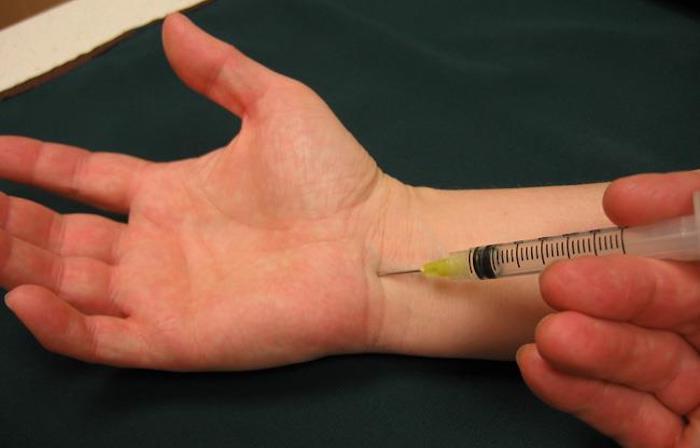
Carpal tunnel syndrome is at least three times more common in women than men and affects about 3% of the population, causing considerable pain and disability. Previous studies have found that the condition often resolves on its own with no intervention. However, when it does not resolve, many treatment modalities may be tried – from the surgical release of the transverse ligament to acupuncture to corticosteroid injections.
Local corticosteroid injections, used widely to manage inflammation and pain in arthritis and tendonitis, have been used to treat carpal tunnel syndrome for over 50 years. The treatment is relatively low cost – much less expensive than surgery – making it worthwhile to determine how effective the treatment approach may be, how long the effects last, and its impact on quality of life.
An international team of researchers explored these issues in a meta-analysis and published their results this year in the Cochrane Database of Systematic Reviews. Their review served as an update to a 2007 paper.
The team searched medical databases for studies that examined the effects of local steroid injections for the treatment of CTS. Improvements in symptoms and function as well as improved results from nerve conduction studies for up to 6 months after the injection were among the endpoints examined. The researchers also looked at requirements for surgery, quality of life, and side effects for up to 12 months. Most of the participants in the studies reviewed had mild to moderate CTS. Patients with comorbid osteoarthritis and/or diabetes were excluded.
Injections Can Be Beneficial for Carpal Tunnel
The reviewers found that local corticosteroid injections are indeed beneficial for mild and moderate carpal tunnel syndrome. The benefits of the procedure can last up to 6 months and might reduce the need for surgery for as long as 12 months, according to reviewed evidence.
The dosage did not seem to make a difference for up to 3 months. However, after 3 months, groups receiving 80 mg equivalent methylprednisolone had better outcomes with respect to symptoms and functionality than the groups receiving moderate doses (40 mg equivalent methylprednisolone). While the evidence seemed to suggest that 80 mg methylprednisolone may be more effective than 40 mg in reducing the need for surgery, smaller doses were also shown to be effective.
The approach seems to be safe as well. Serious complications were rare, although the reviewers noted that not all studies reported adverse events. The studies reviewed did not have enough data to determine whether the administration of local anesthetic made a difference in outcomes.
Precision Pain Care and Rehabilitation has two convenient locations in Richmond Hill – Queens and New Hyde Park – Long Island. Call the Queens office at (718) 215-1888, or (516) 419-4480 for the Long Island office, to arrange an appointment with our Interventional Pain Management Specialist, Dr. Jeffrey Chacko.













